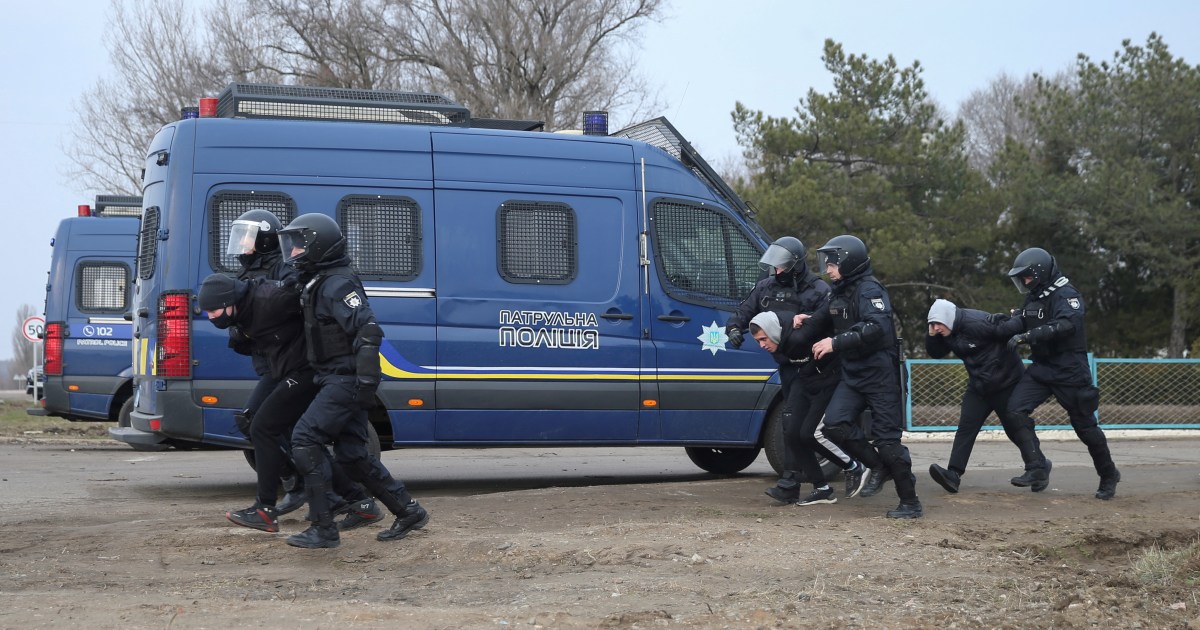US President Joe Biden is making "critical" contacts with his Russian counterpart Vladimir Putin and French Emmanuel Macron, amid US expectations of an imminent Russian invasion of Ukraine, while Kiev has approved a contingency plan in the event of war, and dozens of countries have called on their citizens to leave Ukraine.
Al-Jazeera correspondent in Washington, Nasser Al-Husseini, said that President Biden will hold a crucial call with the Russian president within hours to discuss Western fears of Russia's invasion of Ukraine within days.
At the same time, President Biden held a call with his French counterpart Emmanuel Macron, where the Elysee Palace said that the talks dealt with an assessment of the tension taking place on the Ukrainian border.
For his part, US Secretary of State Anthony Blinken made a phone call with his Russian counterpart, Sergey Lavrov, who stressed that Washington and its allies' propaganda campaign on Russian aggression has provocative goals.
According to the Russian Foreign Ministry, Lavrov stressed Russia's refusal to violate commitments on the indivisibility of security in Europe and the Atlantic Ocean.
She pointed out that Washington and Brussels' reaction to the Russian proposals on security guarantees ignored Moscow's concerns, accusing the West of encouraging Kiev to sabotage the Minsk agreements and attempts to solve the Donbass problem by force.
In turn, the US State Department said that Blinken assured his Russian counterpart that if Moscow followed the path of aggression, this would lead to a firm, broad and unified response, and that the diplomatic path was still open, but it required Moscow to de-escalate.
And the US agency “Bloomberg” quoted officials, whom it described as insiders, that Russia may begin an invasion of Ukraine next Tuesday.
For his part, US National Security Adviser Jake Sullivan said - on Friday - that there is a high probability that Russia will invade Ukraine before the end of the Winter Olympics in China, which concludes on February 20.
For his part, Ukrainian President Volodymyr Zelensky said that "the enemy's best friend is the panic that can affect our people and this should not be allowed."
in the field
On the ground, 400 Russian soldiers began a military exercise on Friday in the Rostov region on the border with Ukraine.
This is happening while tens of thousands of Russian soldiers are continuing large-scale maneuvers in Belarus that will continue until February 20.
For its part, the Russian Defense Ministry announced sending 6 warships to participate in naval maneuvers in the Black and Azov seas.
In return, Washington sent B-52 bombers to Britain, to join 4 destroyers that previously sailed to participate in NATO maneuvers in the Mediterranean.
The joint Russian-Belarusian military exercises are taking place in the "Brest" and "Gomel" fields near the Belarus-Ukrainian border, as part of the maneuvers titled "Union Resilience".
Al-Jazeera correspondent stated that these exercises simulate fighting battles against an attack by an imaginary enemy, in which units of the special forces and the landing forces participate, and for the first time units of the Russian forces of the Eastern Military District participate in the maneuvers.
Ukrainian contingency plan
The Ukrainian side, in turn, continues preparations for a possible war scenario through exercises that began today, Saturday, in the Kherson region, in the north of the Crimea.
Al-Jazeera correspondent said that units from the Ministry of the Interior, the National Police, the National Guard, the Border Guard, and the State Emergency Service are participating in these exercises, which were attended by Ukrainian President Volodymyr Zelensky.
Ukrainian forces are also continuing their military maneuvers in areas in the east of the country and across the border with Belarus.
And stresses that these exercises are aimed at testing the ability of the ground forces to deploy quickly.
Ukrainian preparations are also continuing to confront a possible Russian invasion, as the Kiev city council approved a plan to evacuate residents, with the participation of more than 13,000 civil defense personnel.
international interactions
As part of international interactions with the developments of this crisis, US Secretary of State Anthony Blinken said that Washington does not yet know whether the Russian president has taken a decision to invade Ukraine or not.
Blinken added at a press conference in the Fiji Islands that the United States and its allies would impose economic sanctions on Russia if the invasion occurred.
He stressed that the solution to the crisis must take place within the framework of de-escalation, adding that Washington has so far only seen an escalation from Russia, according to him.
In turn, European Commissioner for Foreign Policy Josep Borrell affirmed the EU's support for Kiev, and said in a tweet on Twitter that he had spoken with Ukrainian Foreign Minister Dmitry Kuleba, and stressed that the European Union and its allies would be firm in acting in the event of Russian aggression against Ukraine.
The Russian response came from the Kremlin, which considered the West's desire to subjugate Russia over the past 15 years as the reason for the instability the world is going through today.
evacuating nationals
In light of the escalation and expectations of the imminent Russian invasion of Ukraine, the US State Department ordered its non-essential employees to leave that country, while the Russian Foreign Ministry said that Moscow decided to “rationalize” its diplomatic staff in Ukraine for fear of “provocations” from Kiev or any other party.
During the past hours, Kuwait, Iraq, Finland, Australia, New Zealand, Britain, Germany, the Netherlands and Lithuania urged their nationals to leave Ukraine as soon as possible, for their own safety.

